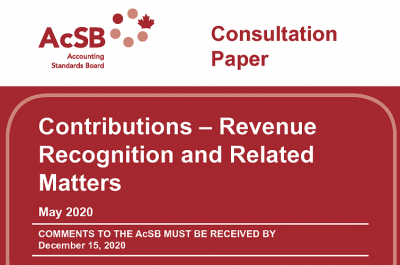In May 2020 the Accounting Standards Board (AcSB) released a consultation paper that explores the possibility of significant changes to the way that Not-For-Profit Organizations (NFPOs) account for contributions.
The talk of change comes from the AcSB’s point of view that the current accounting options add unnecessary complexity to NFPO accounting and sometimes reduce the comparability of financial statements of similar NFPOs. The existing contribution standards, that date back to 1996, permit what are known as the deferral method and the restricted fund method of accounting for contributions. Interestingly, in their research, the AcSB could not find another jurisdiction that provides NFPOs with a similar choice of accounting policies for the timing of recognition of contributions.
A key concept that is raised in the consultation paper is whether there is any merit to accounting for contributions based on their characteristics rather than the current approach of making a one size fits all policy choice for all contributions. Such characteristics may include external limitations on what the amounts may be used for as well as provisions that require repayment of unused funds at a certain point in time. The paper also explores the treatment of contributions for the acquisition of capital assets, endowments and bequests.
Somewhat unrelated to contributions, the paper explores the exemption from capitalization of capital assets that is currently permitted to ‘small’ NFPOs. The exemption is available to all NFPOs with revenues of less than $500,000 which the AcSB now views as an arbitrary amount which is hard to argue against. The paper explores the possibility of determining a more suitable size test to the current revenue test as well as the possibility of the removal of this exemption altogether. Feedback in the past has indicated to the AcSB that elimination of the exemption is widely supported as recognizing capital assets in smaller NFPOs would not be overly onerous which we tend to agree with as well.
The consultation paper also discusses the concepts of fund accounting and its benefits and limitations. The confusion between fund accounting and the restricted fund method of accounting for contributions, which we encounter often when presenting PD courses on this topic, is discussed as well. The paper also highlights as some broad presentation and disclosure issues which we think foreshadows that more guidance in this area for NFPOs is forthcoming.
In total, the paper is 23 pages long and is a must read for any assurance practitioners that work extensively with NFPOs. The AcSB is seeking feedback to its paper which includes 49 specific questions on the topics it covers. Responses to these questions, as well as other commentary, will be received by the AcSB up until December 15, 2020. You can download the consultation paper here.
